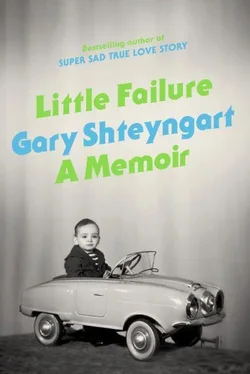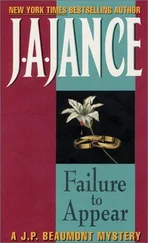And here I am shuddering with excitement behind a tree while the big papa is hunting for me, he really can’t find me! And above me, Lenin is gesturing acquisitively toward Finland, his dome balder than my father’s, which is still fringed with some hair between the temples. I am hiding behind a spruce, and my father is singing, “ Synochek, Igoryochik, gde ty? ” (Little son, Little Igor, where are you?), and I am inhaling one forbidden icy spruce breath after another.
The sun is setting on us and Lenin and the House of Spies, and soon the game will be called off on account of cold. There is a theory floating around that I will become overheated from playing and that my hot bare neck will combine with the autumn frost to make the sickness return. Like Fermi’s Paradox this theory is difficult to prove one way or another, but generations of Russian women have worked it out in their kitchens, factories, and offices.
I do not want the game to stop. You know what, I still don’t want the game to stop. Not even today, May 25, 2012. Because my father is bigger than me. He is still the big one. And I can see him among the spruces in his light coat (which smells, as everything else does around here, of steaming cabbage) and his brightly colored, possibly irradiated, plaid scarf. And he is looking for me. Here is Father, above me, and here is Lenin above him, and this is my family and this is my country. Am I feeling this or am I thinking it? Both, I am sure. I already understand how easily a feeling can become a thought and the other way around.
“I’ve lost him, I’ve lost my son,” my father is wailing. “I’ve lost my little Igor. Where is he? I simply cannot find him.”
Is he kidding or is he seriously worried?
And I want to jump out and say, “Here I am! You haven’t lost me at all!” But this is against the rules of the game. Isn’t all the fun in staying hidden ? You’re supposed to feel scared when the papa who’s looking for you gets closer, is about to find you, but instead I feel sadder when he seems to lose my scent. And then when he approaches I feel scared again. Sad, scared. Scared, sad. Is that what I’ve been looking forward to for so long in my sickbed? No, it is this: Suddenly Papa jumps out from behind an adjoining spruce, screams “Found you!” and I scream with joy and try to escape. He scoops me up in one easy gesture, hoists me onto his shoulders, and we walk past the Lenin, who is also happy that I’ve been found, toward our apartment one gigantic Stalinist block away where Mother is making cabbage soup, hot and tasteless.

We live on Tipanov Street, House 5, Apartment 10. A sign at the mouth of the street informs us that ALEXANDER FYODOROVITCH
TIPANOV (1924–1944) WAS A BRAVE DEFENDER OF THE CITY OF LENIN. IN 1944, HE SHIELDED HIS TROOPS WITH HIS BREAST AGAINST ADVANCING FIRE, ALLOWING HIS COMRADES A SUCCESSFUL CHARGE FORWARD. THE FEARLESS WARRIOR WAS POSTHUMOUSLY AWARDED THE TITLE HERO OF THE SOVIET UNION. I like to think that my grandfather Isaac, my father’s father, who also died in the war at a ridiculously young age, performed a similar feat, even if he wasn’t a Hero of the Soviet Union. Oh, how I would love to put my own breast in front of some artillery fire so that my comrades could charge forward and kill Germans. But first I will have to make a friend or two my own age, and that equally heroic feat is still years away.
As my father carries me from the hide-and-seek spruces by the Lenin statue to Tipanov Street, House 5, Apartment 10, we pass by the other important institution in my life, the pharmacy.
One of the most frightening words in the Russian language is banki , which nominally refers to the plural of a glass or ajar but which the Oxford Russian-English dictionary also helpfully describes as “( med .) cupping glass.” I’m not sure about the med . part, because I’ve yet to meet any sufferer of asthma, pneumonia, or any other bronchial disaster that this insane form of peasant remedy has ever cured. The local pharmacy carries few useful medicines, but the least useful of them is banki . The application of said “cupping glass” to the soft white back of a wheezing Leningrad boy in 1976 represents the culmination of three thousand years of not-so-great medical intervention beginning with the traditional practices of the Greeks and the Chinese and ending here at the pharmacy on Tipanov Street.
This is what I remember all too well. I’m lying on my stomach. The banki are produced; they are little glass jars, greenish in tint, each probably the size of my child-foot. My entire back is rubbed with Vaseline by my mother’s strong hand. What follows is frightening beyond words for any sane adult, let alone an anxious child. A pair of tweezers wrapped in cotton is soaked in vodka or rubbing alcohol and set on fire. The flaming pincers are stuck into each glass cup, sucking out the air to create suction between the cup and the skin. The cups are then clamped along the length of the patient’s back, supposedly to pull the mucus away from the lungs but in reality to scare the little boy into thinking his parents are raving pyromaniacs with serious intent to hurt.
Let me close my eyes now. I’m hearing now a long match struck against the matchbox by my mother— ptch— then the flames of the pincers as orange and yellow as the polluted Leningrad sunset, then the whoosh of air being sucked out as if by a neutron bomb, just like the one the American imperialists are threatening on television to use against us, then the sting of the warm glass against my back. And then ten minutes of lying as still as a dead October leaf at the bottom of a pool, lest the banki pop off my tortured back and the whole procedure is to be repeated again.
The first step of our multipart emigration to America will involve a weeklong stop in Vienna, before we move on to Rome and, finally, New York. I will be six years old and breathless from asthma per the usual and will have to be taken to a Viennese medical clinic. Herr Doktor will take one look at my black-and-blue-bruised back and prepare to call the Austrian police forces with a fresh report of child abuse. After my parents nervously explain that it was merely “cupping,” he will laugh and say: “How old-fashioned!” or “How idiotic!” or “You crazy Russians, what will you do next, huh?” He will give me something I have never encountered back in the USSR: a simple steroid-fueled asthma inhaler. For the first time in my life, I will enjoy the realization that I do not have to choke to death every night.
But right now there is no such solace. And both my father and I know that the fun we just had running among the spruces beneath the Lenin in Moscow Square will exact a price. Tonight I will be sick. In fact, I know even as we walk past the pharmacy with its bold, ugly APTEKA sign, I am already instructing my lungs to shut down. Another thing we do not realize in 1979: Asthma is, at least in part, what they call an “emotional disease,” triggered by stress and fear.
But fear of what?
Sweaty me is carried into the warm, cabbagy apartment and my mother is screaming at my father: “How could you stay out so late? How could you let him run in the cold? He’s overheated! Now he will be sick!”
And he starts screaming back at her, “Oy, yoi, yoi! She knows everything! A fucking doctor she is!”
“Don’t swear”— Ne rugaisya matom— “the child is here.”
To me: “Igor, ne povtoryai .” Don’t repeat our cursing.
“You’re the one who swears.”
“Me? You know what? Go to the dick!” Poshol na khui .
“Fuck your mother!” Yobtiki mat’ . I record and mispronounce the bad words inside myself.
Читать дальше













